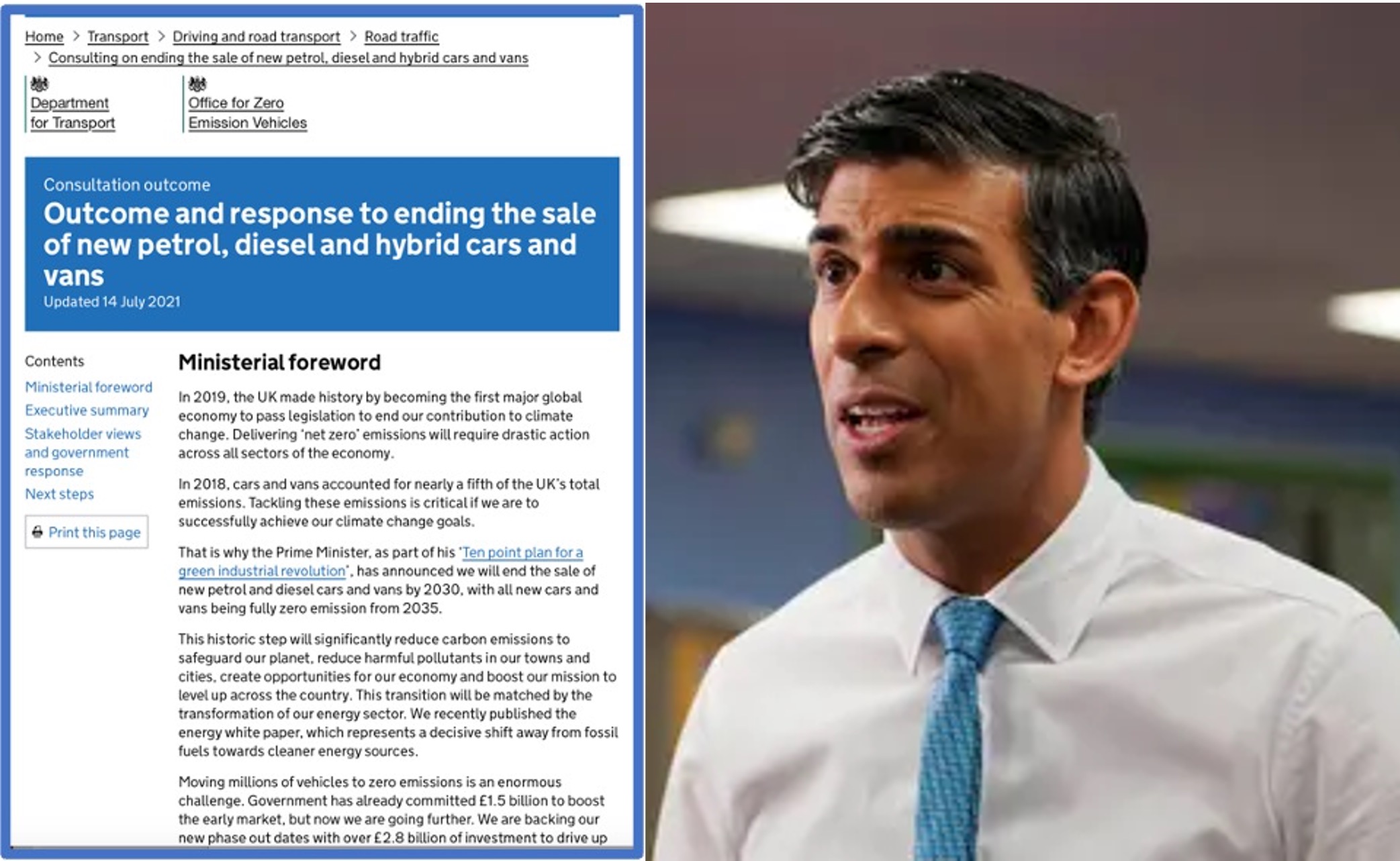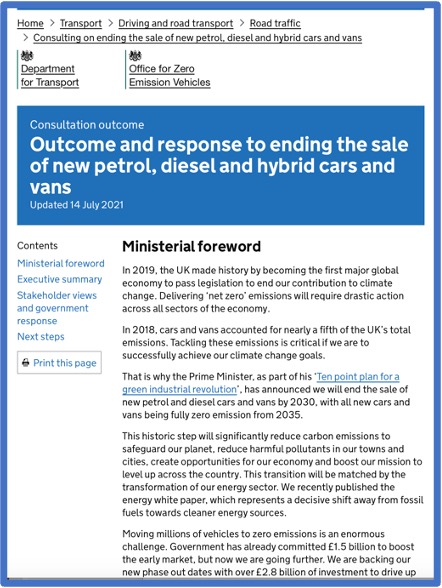This is Blog No 42
Rishi Sunak’s net zero ‘U’ turn has obviously prompted huge debate on its environmental, industrial and social consequences. Here are some constitutional issues.
For, inadvertently, he has highlighted the disservice current politicians do to our democracy by trying to pick and choose when to consult the public.

He is right to seek to ‘carry the public with him’ regarding major behaviour change.
And that is why, presumably, seven days after he became Chancellor of the Exchequer, on 20th February 2020, the Government launched a consultation on ending the sale of new petrol, diesel and hybrid cars and vans.
This was a very comprehensive consultation.
It said that:
…the Government is seeking views on bringing forward the end to the sale of new petrol, diesel and hybrid cars
and vans from 2040 to 2035, or earlier if a faster transition appears feasible. We are asking for views on:
# the phase out date,
# the definition of what should be phased out,
# barriers to achieving the above proposals,
# the impact of these ambitions on different sectors of industry and society,
# what measures are required by government and others to achieve the earlier phase out date,
Note that the main options on the table were a phase-out date of 2040 or 2035.
It may have surprised many, therefore when, a year later on March 10th, 2021 – when Rishi Sunak was very firmly installed at the heart of the Johnson administration, Grant Shapps and Kwasi Kwarteng announced that they would bring forward the phase-out date to 2030.
Portraying themselves as enthusiastic saviours of the planet, and self-satisfied in their roles of exploiting BREXIT freedoms, by stealing a march on our laggardly European neighbours, this was a challenge that the Government was fully committed to meet.
Note that this was not, as the Home Secretary suggested today a policy mistakenly chosen without much thought and overtaken by the unforeseen distraction of COVID; this was fully 12 months after the pandemic began.
And Ministers made a sound case for their policy. Read the Government’s response. Not only would it reduce emissions faster, but it would “support economic growth in the UK by bringing skilled jobs and investment in the energy and automotive sectors.”
– providing an opportunity for well-informed stakeholders to express a view

Contrary to popular mythology, they are not always conservative-minded guardians of the status-quo; in this case there were technology and environmental visionaries, and Ministers listened. One feels like congratulating them for being persuaded for this is what the consultation response said:
Some respondents took the view that building an ecosystem around zero emissions would enable the UK to
attract investment in the development and manufacturing of ZEVs and associated technologies throughout the
supply chain, such as battery manufacturing for BEVs. This could lead to a significant expansion of employment
in the vehicle and energy industries and increased momentum for innovation in new technologies. By bringing
the date forward, it was argued that the supply of ZEVs would increase sooner, which could stimulate consumer
demand for these vehicles through lower costs and lead to greater numbers of ZEVs on the road faster.
(ZERO = Zero-emission vehicles)
So, this was no ill-considered whim of Boris Johnson. It is true that Sir Anthony Seldon’s recent book about him paints a picture of someone keener on a headline depicting him as the heaven-sent leader marching purposefully towards the promised land than on addressing the hard detailed graft of getting there. But this was transparently evidence-based policy-making where consultation attracted 1,478 responses – and where a reasoned case was made by Ministers.
Governments must, of course be at liberty to change their minds, and if they addressed the issues that led them to the 2021 conclusion and explained why they are no longer valid, one might have some understanding of their position. The Prime Minister is suggesting that the public no longer support the policy, but if that is the case, he should test out his theory by launching a fresh consultation.
Where an original policy is the result of a visible, public process, it is very risky politics to discard that same policy without listening to those whose views were so eagerly sought first-time around.
The truth is that there are lots of stakeholders – and their interests and views will differ.
Sunak has made the mistake of imagining that Daily Express-reading ‘hard-working families’ suffering from the cost of living squeeze are the only stakeholders he needs to consider. Having heard the response of the car manufacturers whose investment plans he has just jeopardised, someone had better show him their original stakeholder mapping diagram, and maybe send him on a Consultation Institute course or two.
Or maybe we’ll send him a copy of The Politics of Consultation
Rhion H Jones
Postscript: After publishing this, someone asked me how Sunak might have benefitted from consulting. So I wrote a follow up blog - https://tinyurl.com/4j7tb2s6 and also a short video -
See Rhion's speeches etc
For More like this - free of charge: now click here
Leave a Comment
I hope you enjoyed this post. If you would like to, please leave a comment below.